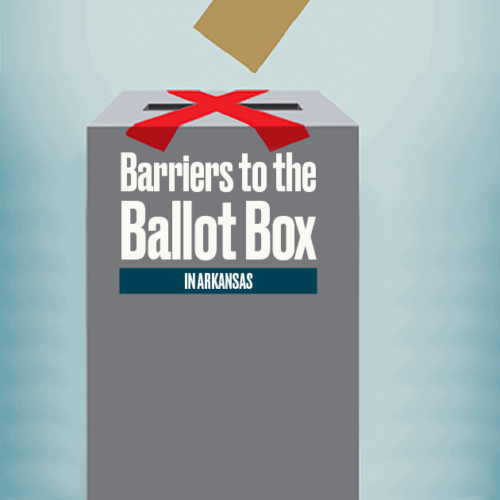Introduction
From having one of the earliest registration deadlines allowed by federal law — a month before the election — to not informing voters if a minor error means their absentee ballot won’t be counted, Arkansas employs a variety of disenfranchisement tactics.
In the 2016 presidential election, about one in 20 absentee ballots in Arkansas were rejected, according to an analysis by the Arkansas Democrat-Gazette, compared to a national average of one in 100.
Sign up for The Moment newsletter
Our CEO Susan Smith Richardson guides you through conversations and context on race and inequality.
With five days to go before the 2020 election, more than 100,000 absentee ballots have been returned, compared to 30,000 cast during the entire 2016 election.
Here’s a look at some of the most significant barriers to voting rights and access in the state:
Absentee ballots
Republican Gov. Asa Hutchinson agreed to let voters use COVID-19 as an excuse to cast absentee ballots this fall, but the state can reject ballots without telling people they made a mistake in submitting them.
A suit filed by the League of Women Voters sought to establish a “curing” process in which voters would be given the opportunity to address mistakes such as missing or mismatched signatures rather than have their vote not count. A federal judge denied the organization’s request for an injunction.
Absentee ballots will be counted as long as they are received by Election Day, but that standard was in doubt for a while this fall.
A 2013 state law doesn’t allow local election officials to begin counting absentee ballots until 8:30 a.m. on Election Day and says they must stop tallying them at 7:30 p.m. the same day. Realizing there would be a potentially record-setting number of absentee ballots to process this year, two voters sued to overturn the provision. Plaintiffs in the suit and state officials noted that local officials have “routinely ignored” the 7:30 p.m. deadline provision since the law was passed, and that it conflicts with other sections of state law.
While the case was being heard, the state Board of Election Commissioners voted to declare that all absentee ballots received by Election Day would be counted.
Felony disenfranchisement
Black people in Arkansas are incarcerated at four times the rate of white people, and the state takes away the right to vote from people who are imprisoned, or on probation or parole for a felony conviction. Voting rights aren’t restored unless an applicant can prove that all court fees and fines associated with their conviction have been paid.
Meanwhile, the state’s prison population has increased 289% since 1983 and 44% since 2000. Black people represent 16% of the state’s population, but 41% of the people in prison.
Voter ID
The requirement that citizens present government-issued photo ID at the polls before they’re allowed to vote is a modern disenfranchisement tactic, pushed in copycat legislation across numerous states controlled by Republican legislatures during the past 15 years.
Arkansas passed a strict voter ID law in 2013 that was struck down by the state Supreme Court the following year. In 2017, the state adopted the rules that are on the books now. It passed muster with the court because of one key difference: Voters who lack the required ID can sign an affidavit at the polls swearing to their identity, versus the previous law’s requirement that voters cast a provisional ballot that would not count unless they returned with the required ID.
Read more in Money and Democracy
US Polling Places
In Kansas, a legacy of voter suppression clouds progress
Activists push back against an unfounded fear of voter fraud.
US Polling Places
South Carolina’s history of disenfranchisement looms over tight U.S. Senate race
A surge in absentee ballots prompts court battles over witness and signature requirements.


Join the conversation
Show Comments